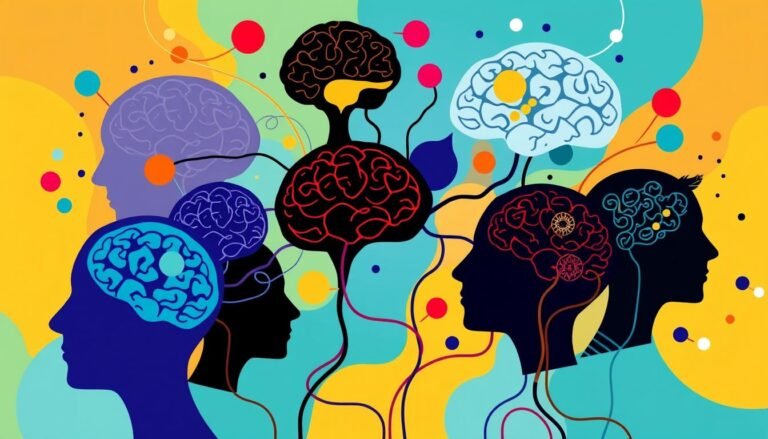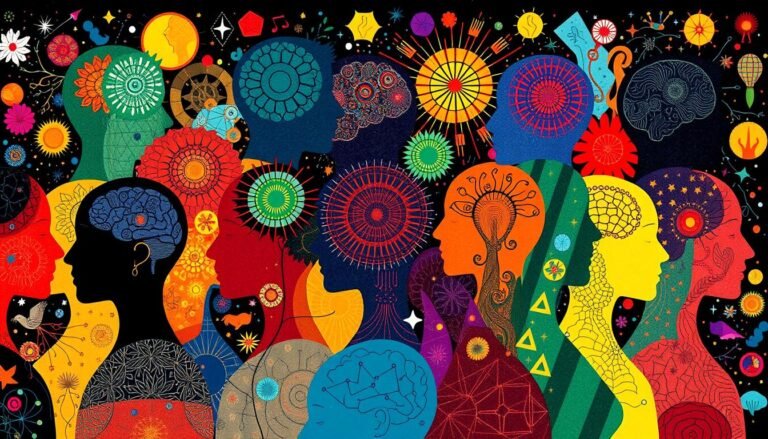Personality and Cultural Differences: A Guide
Imagine walking into a lively international conference in Madrid. You see people from all over, each with their own culture. A quiet Japanese person bows, while an energetic Italian talks with big gestures. This shows how different personalities and cultures interact.
Professor Ramon Mendez Rodriguez teaches about these differences at IE University. He knows a lot about people and culture, thanks to his work at big companies like Coca-Cola and Unilever. Ramon helps students understand how to communicate well across cultures.
In today’s world, knowing about these differences is key. It helps us be more inclusive in our daily lives and work. This guide will dive into how personality and culture affect our interactions and views of the world.
Key Takeaways
- Personality is influenced by both genetic and environmental factors
- Cultural context plays a significant role in shaping personality traits
- Understanding cultural differences enhances cross-cultural communication
- The Five-Factor Model provides a framework for studying personality across cultures
- Developing cultural intelligence is essential for navigating diverse environments
Understanding Personality: Nature vs. Nurture
The debate over nature versus nurture is still a big topic in research. It explores how our genes and environment shape who we are. Knowing this helps us understand how to get along with people from different cultures.
Genetic Influences on Personality
Our genes have a big part in making us who we are. Studies show that about half of our personality traits come from our genes. Traits like being open or responsible have strong genetic links.
Environmental Factors Shaping Personality
Our surroundings also shape us, like family and life experiences. These things help form our character. They can either support or change what our genes suggest.
The Interplay Between Genes and Environment
The debate is not just about genes or environment. It’s about how they work together. This interaction shapes our ability to understand different cultures and adapt to new situations.
| Aspect | Nature (Genetic) | Nurture (Environmental) |
|---|---|---|
| Influence on Personality | ~50% of trait variance | ~50% of trait variance |
| Key Factors | Inherited traits, genetic predispositions | Cultural norms, family dynamics, life experiences |
| Impact on Cultural Intelligence | Innate adaptability, openness to experience | Learned behaviors, exposure to diverse cultures |
Understanding the balance between nature and nurture helps us get better at working with people from different backgrounds. This knowledge helps us communicate more effectively and appreciate the diversity of humanity.
The Five-Factor Model of Personality
The Five-Factor Model (FFM) of personality, also known as the Big Five, is key to understanding human behavior. It offers a framework for assessing broad personality traits. This makes it very useful for learning about multicultural awareness and exploring ethnic identity.
The FFM includes five main traits:
- Neuroticism
- Extraversion
- Openness to Experience
- Agreeableness
- Conscientiousness
Research shows the FFM works well across different cultures. Studies using the Revised NEO Personality Inventory have found support in over 50 cultures. These cultures speak many different languages.
Cross-cultural studies show interesting patterns. For example, women often score higher on neuroticism and agreeableness in many cultures. Gender differences in personality traits are more noticeable in developed societies than in less-developed ones.
The FFM has many practical uses. It helps predict important life outcomes like health behaviors, well-being, and job performance. This makes it a valuable tool for understanding how cultural values shape individual personalities and influence societal norms.
| Trait | Description | Cultural Variation |
|---|---|---|
| Neuroticism | Emotional stability | Filipinos score relatively low compared to other cultures |
| Extraversion | Sociability, assertiveness | Varies across cultures, often higher in Western societies |
| Openness | Curiosity, creativity | Often higher in individualistic cultures |
| Agreeableness | Cooperation, empathy | Generally higher in collectivist cultures |
| Conscientiousness | Organization, reliability | Varies, but often higher in cultures valuing achievement |
Cultural Context and Its Impact on Personality Development
Cultural context is key in shaping who we are. It mixes sociocultural factors with our traits. This mix defines our unique characteristics. Knowing this helps us be more sensitive to cultures and promote diversity and inclusion.
Cultural Values and Norms
Every culture has its own values and norms. These guide our behavior and shape our personality. People in individualist cultures tend to focus on themselves, while those in collectivist societies focus on the group.
This cultural influence affects how we see good and bad traits. It varies from one society to another.
Social Expectations and Roles
Social expectations and roles shape our personalities. For example, gender roles can make men and women behave differently. Margaret Mead’s studies showed how culture influences our growth and how we express ourselves.
Religious and Philosophical Influences
Religion and philosophy also shape us. They guide our morals, goals, and how we interact with others. Erik Erikson’s work showed how beliefs and values shape our personalities across cultures.
“Culture is to society what personality is to the individual.” – Clyde Kluckhohn
Understanding the link between culture and personality is vital. It helps us see the diversity of human experiences. It also builds empathy and understanding among cultures.
Cross-Cultural Communication and Personality Traits
Personality traits greatly affect how we communicate across cultures. The Five-Factor Model (FFM) helps us see how different traits influence our interactions with others from different backgrounds. A study in Saudi Arabia with international students showed interesting links between personality and communication skills.
The study found that being open-minded and organized helps in communicating across cultures. On the other hand, being emotionally stable is key to better interactions. This means that staying calm and composed is important when dealing with cultural differences.
Cultural intelligence (CQ) is crucial for effective communication across cultures. It’s about being able to adapt and function well in different cultural settings. Traits like being open to new experiences and outgoing help build CQ.
| Personality Trait | Correlation with ICC | Impact on Cross-Cultural Communication |
|---|---|---|
| Openness | Positive | Enhances adaptability and curiosity |
| Conscientiousness | Positive | Improves organization and reliability |
| Neuroticism | Negative | Hinders emotional stability in new contexts |
| Extraversion | Neutral | May facilitate social interactions |
| Agreeableness | Neutral | Can promote harmony in diverse settings |
Knowing how personality traits affect our ability to communicate across cultures is important. It helps us and our organizations improve our skills. By encouraging traits like openness and organization, we can better handle global interactions.
Personality and Cultural Differences: Key Concepts
Understanding personality across cultures is key. It connects individual traits with societal norms. These ideas help us understand human behavior in different settings.
Cultural Intelligence (CQ)
Cultural intelligence is about adapting and thriving in different cultures. It includes knowing how to interact well across cultures. People with high CQ are more sensitive and aware of different cultures.
Intercultural Competence
Intercultural competence is about communicating and working together across cultures. Studies show that people from Central and South America are more open to experience. This openness leads to better teamwork and understanding in diverse groups.
Ethnic Identity and Personality
Ethnic identity shapes how we see ourselves and others. For example, Americans value independence, while people in collectivist cultures focus on group harmony. This shows how culture influences our personality.
| Culture Type | Values | Personality Traits |
|---|---|---|
| Individualist | Independence, Competition | Personally oriented |
| Collectivist | Social Harmony, Group Needs | Socially oriented |
Knowing these concepts helps us understand and appreciate different cultures. It leads to better relationships in our diverse world.
Universal vs. Culture-Specific Personality Traits
Personality traits have both universal and culture-specific sides around the world. The Five-Factor Model of personality is mostly the same everywhere. This shows a common base for human personality globally.
Studies in 51 cultures show personality patterns linked to culture. For example, people in Asian cultures tend to be less extroverted. This matches their collectivist values.
Even though universal traits exist, how they show up varies by culture. In Central and South America, people are more open to new experiences. Europeans often show more neuroticism. These differences show how cultural values shape personality.
Gender differences in personality also change with culture. In a study of 26 cultures, women scored higher in Agreeableness and Neuroticism. These differences are more noticeable in Western cultures with individualistic values.
| Culture Type | Personality Trait | Characteristic |
|---|---|---|
| Asian | Extroversion | Lower scores |
| Central/South American | Openness to Experience | Higher scores |
| European | Neuroticism | Higher scores |
| Western | Gender Differences | More pronounced |
It’s key to understand both universal and culture-specific traits for diversity and inclusion. This helps in better understanding and working with people from different backgrounds. It leads to better communication and teamwork.
Gender Differences in Personality Across Cultures
Research shows that gender differences in personality traits are common worldwide. These differences come from biology, how we are raised, and what our culture expects of us. Knowing about these differences helps us be more understanding and inclusive globally.
Biological Factors
Studies suggest biology affects our personality. Women tend to score higher in Neuroticism and Agreeableness on personality tests. These findings are seen in many cultures, pointing to a biological link.
Socialization and Gender Roles
How we grow up and what our culture expects of us shapes our personality. Gender roles vary, affecting how we show our personality. For instance, in traditional societies, personality differences between men and women might be less clear because of strict rules.
Cultural Expectations and Gender Expression
Our culture influences how we express ourselves. Interestingly, in Western, individualistic societies with more gender equality, personality differences between men and women are more noticeable. This shows how culture and personality interact in complex ways.
| Trait | Women | Men |
|---|---|---|
| Agreeableness | Higher | Lower |
| Neuroticism | Higher | Lower |
| Extraversion | Slightly higher | Slightly lower |
| Risk-taking | Lower | Higher |
It’s key to understand these gender differences in personality to create welcoming spaces. This knowledge helps us value the diversity of human expression and avoid making assumptions based on gender or culture.
Personality Disorders: A Cross-Cultural Perspective
Personality disorders show up differently in various cultures. This shows we need to be sensitive to culture when we diagnose and treat. Research points out that culture greatly affects how these disorders are seen and acted out.
Borderline Personality Disorder (BPD) is a good example. It’s found all over the world, but it looks different in non-Western cultures. This shows how important it is to understand different cultures in mental health.
Culture affects how often we diagnose certain disorders. In the U.S. and Great Britain, Black people are less likely to be diagnosed with BPD than White people. But, Hispanic immigrants in the U.S. are more likely to get this diagnosis. These differences show we need to be careful with how we diagnose.
“Culture shapes not only the expression of personality disorders but also their interpretation and diagnosis.”
Personality disorders are more common in some places than others. In Great Britain, 7.6% of people have them. In indigenous Australia, 30% of people have them. These numbers show how culture affects mental health diagnoses.
What BPD looks like can vary by culture. Things like suicide, self-harm, and problems with relationships and identity can look different. This variety means mental health workers need to understand different cultures better.
Looking at personality disorders from different cultures shows us how important cultural sensitivity is. Psychology needs to consider culture to help people from all backgrounds.
The Role of Language in Personality and Cultural Expression
Language plays a big role in shaping our personalities and cultural expressions. It’s crucial for effective cross-cultural communication and building cultural intelligence. A study at Ariel University showed that people can change from having a single language personality to a multi-language one. This shift helps in bridging cultural gaps.
Linguistic Relativity and Personality
The words we choose can alter our worldview. For instance, saying “girls are as good as boys at math” might seem harmless. Yet, it can perpetuate outdated beliefs without us realizing it. Our word choices are more significant than we think in promoting multicultural awareness.
Bilingualism and Personality Shifts
Speaking more than one language can influence our behavior. Research indicates that bilingual individuals may exhibit different behaviors when switching languages. This ability is beneficial for working with diverse groups. UNESCO emphasizes the importance of global literacy, especially for the young.
Cultural Metaphors in Language and Personality
Every language, with its 7,000 varieties, carries unique sayings that mirror its culture. These sayings influence how people think and behave. By learning these, we gain insights into and connections with different cultures. It’s a key step in enhancing cross-cultural communication and our cultural intelligence.
Source Links
- Conceptual and methodological issues in the study of the personality-and-culture relationship
- What to Know About Nature vs. Nurture
- Nature and Nurture: How Culture Shapes Us
- Nature vs. Nurture: Differences and Examples
- Big Five personality traits and culture
- Cross-Cultural Research on the Five-Factor Model of Personality
- Cross-cultural examination of the Big Five Personality Trait Short Questionnaire: Measurement invariance testing and associations with mental health
- Culture and Personality
- Role of Culture in the Development of Personality
- Microsoft Word – IMPES-6179-排版.docx
- Cross-Cultural Studies of Personality Traits and their Relevance to Psychiatry
- Niche diversity can explain cross-cultural differences in personality structure
- Microsoft Word – 02 Rings, Allehyani.doc
- 10.8 Cultural Understanding of Personality
- Cultural Understandings of Personality
- Frontiers | Are Personality-Based Intellectual Styles Culture Specific or Universal?
- Gender Differences in Personality across the Ten Aspects of the Big Five
- Understanding why the gender gap in personality traits is widening
- Cross-Cultural Manifestations of Borderline Personality Disorder
- Personality Disorders and Culture (Chapter 23) – Textbook of Cultural Psychiatry
- Microsoft Word – Layout-IES-p13
- The power of language: How words shape people, culture
- Who Are You? The Relationship Between Language and Personality








